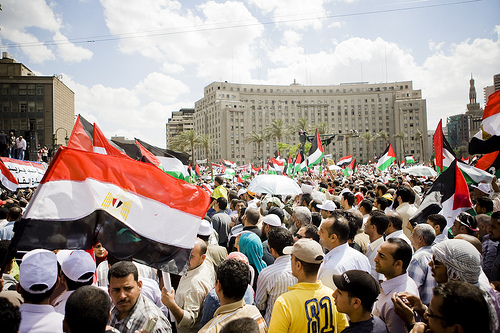The Egypt Effect: Stability vs. Uncertainty
by Mesfin Negash / July 13, 2012 / 2 Comments
Dictators use fear of uncertainty to quash Egypt-inspired revolutions

Images from Tahrir Square like the one above shook the world. Is Ethiopia next? Photo: Hossam el-Hamalawy, Creative Commons
The peaceful protest that brought down Mubarak inspired millions across the world and forced the “super powers” to distance themselves, at least for a while, from their long-time “ally.” However, the protest movement that engulfed the Arab world still has much in store to attract our attention, if not our surprise. The unintended consequence of the Libya-Egypt “revolutions” is their lasting effect on the minds of millions still toiling under brutal dictatorships. In Ethiopia for example, neither political citizens nor the regime have failed to glean lessons and inspiration from Egypt.

- Why does a country with her own unique alphabet and long history of writing persist to deny citizens the right to freedom of expression in this era of Expression? No other country in Africa may typify this paradox more than Ethiopia. As Leopold Senghor’s famous collection of poems entitled “Ethiopiques” remained ‘powerful and popula’ so does the source of his intriguing title, Ethiopia, in her own ways. In “Ethiopiques,” I share Ethiopian views on pertinent issues related to journalism, culture and, of course, the overarching subject of politics.

- Mesfin Negash is an Ethiopian journalist living in exile in Sweden. He is one of the journalists accused of “terrorism” in 2011 by the Ethiopian government. The co-founder and first editor-in-chief of an acclaimed Ethiopian newspaper, Addis Neger, he is currently the Managing Editor of Addisnegeronline.com. He is a political science student by training and known for his critical commentaries on significant political and social issues.
The “Egypt effect” is vivid in Ethiopia. So much so that the Ethiopian government has officially stated that calling for an Egyptian kind of public protest is a crime against the constitution. Accordingly, last month the “court” convicted six journalists including myself, along with 18 other politicians and human right activists, of “supporting terrorism” and “inciting the public, conspiring and planning an act of terrorism…” In effect, anything that inspires the public to demand political reform can be interpreted as a crime in Ethiopia.
Initially government officials were justifying their dictatorship, with respect to the Arab Spring, by claiming that Ethiopia’s economy is doing much better than Libya’s and Egypt’s, and therefore, the Ethiopian public have no reason to start an uprising. PM Meles Zenawi further claimed that “Ethiopia and much of the Sub-Sharan Africa already had its own African Spring back in the 1980’s and the Arabs are ‘latecomers to the game’.” It was simply a mockery of the economic and political reality in Ethiopia. None of the Arab countries are poorer and more underdeveloped than Ethiopia by any standards. Moreover, the political repression in Ethiopia is following the same pattern as it was under Mubarak and Gaddafi, excepting some local peculiarities.
Lately the argument in pro-regime African media outlets has become stability versus uncertainty. The argument is that stability under an existing dictator is better than uncertainty in a post-revolution society. It tries to justify dictatorship by appealing to stability. But in Ethiopia, where all forms of dissent and attempts to bring about genuine political reform are criminalised, where people are denied basic rights, where economic injustice is a part of life, where all political and social institutions fail to deliver on their promises, and where the light at the end of the tunnel has disappeared, people have no choices but uprising or revolution.
We are asked to remain prisoners, to fear uncertainty, and to enjoy stability under dictatorship and oppression. Certainly, I would prefer a controlled, genuine transition from dictatorship to democracy. However, there was no hope for this kind of transition under Mubarak and Gaddafi, even at the eleventh hour of their regime. Therefore it also is very unlikely to have a genuine transition from dictators such as Meles Zenawi, Yahja Jammeh (Gambia), and Hassan Al-Bashir (Sudan). Protests, uprisings, and revolution become inevitable wherever the stability provided by a dictatorship reaches an impasse.





2 Comments on "The Egypt Effect: Stability vs. Uncertainty"
Trackbacks for this post